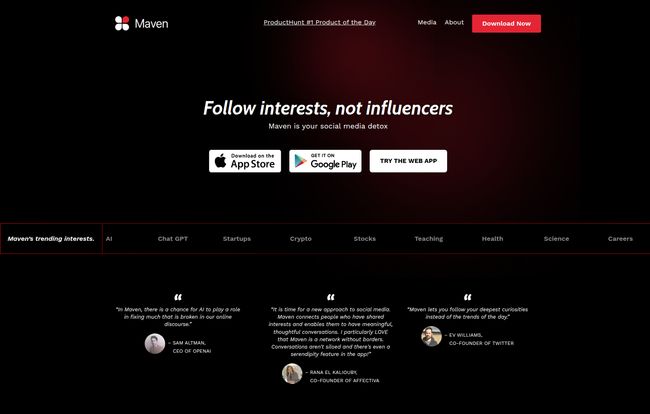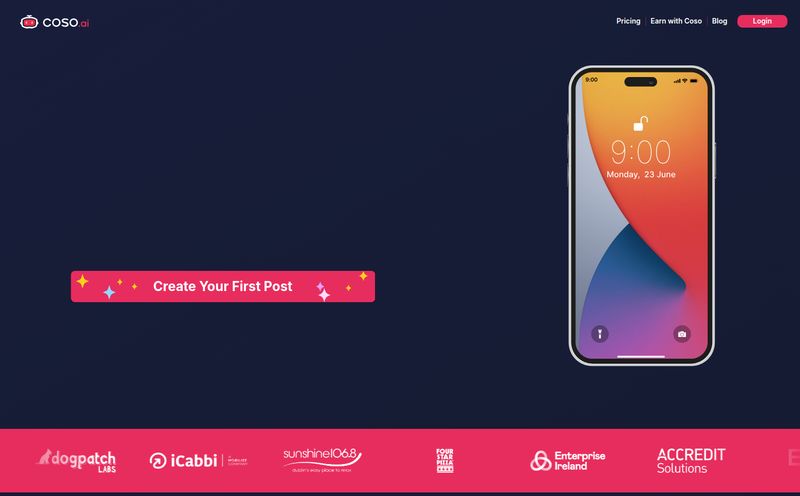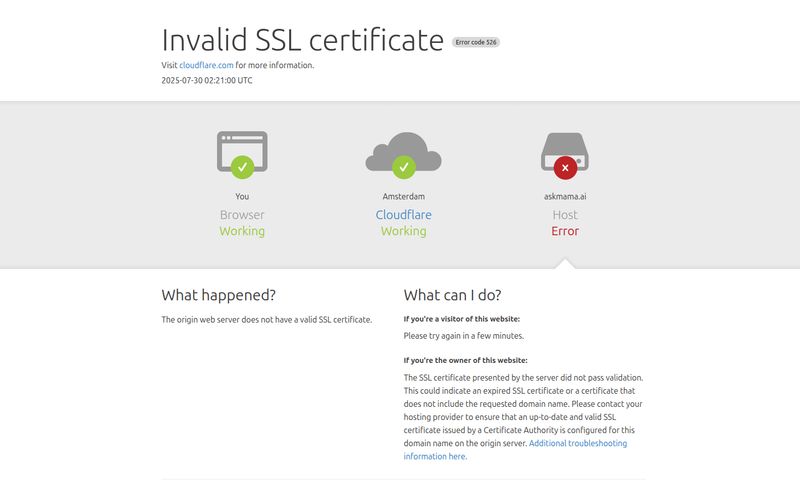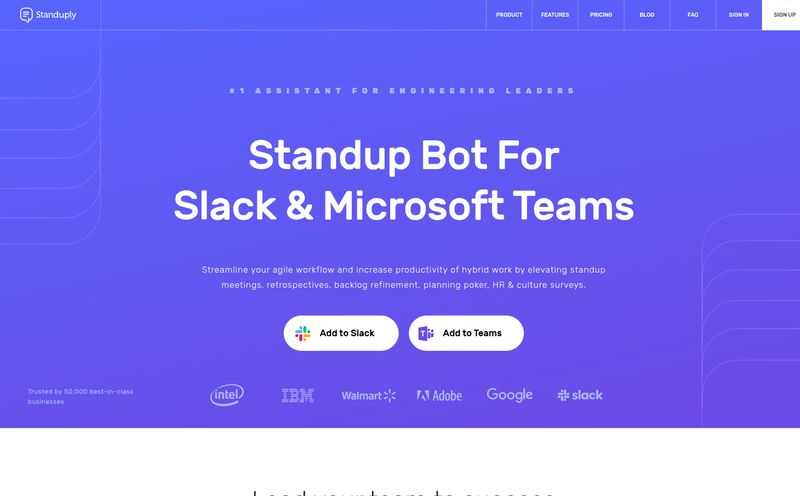As someone who lives and breathes SEO, traffic, and the digital world, my relationship with social media is... complicated. It's a necessary evil, right? A chaotic marketplace of hot takes, vanity metrics, and algorithms designed to keep us scrolling until our thumbs go numb. We're all chasing likes, follows, and that sweet, sweet dopamine hit, but I often find myself wondering what it's all for. The conversations feel shallow, the communities feel like echo chambers, and honestly, it’s exhausting.
So when I heard about a new platform called Maven, my professional curiosity was piqued. The tagline alone hit me like a ton of bricks:
Follow interests, not influencers.
Could it be? A social network that's actually... social? A place for real talk instead of popularity contests? A social media detox that you don't have to leave social media to achieve?
I had to check it out. And I have some thoughts.
So, What is Maven, Really?
Maven isn't trying to be the next TikTok or Instagram. Thank god. Instead, it’s carving out a completely different space. Imagine a platform where the quality of your idea is the only thing that matters. Where you don’t have to spend months building a following just to have someone, anyone, see your post. That’s the core promise of Maven. It's designed from the ground up to connect people through shared interests and curiosities, using smart algorithms to foster deep, meaningful conversations.
And when I say it's built by people who know what they're doing, I mean it. The team is a trifecta of tech heavyweights. The CEO, Ken Stanley, was a research manager at OpenAI. The CTO, Jimmy Secretan, built scalable systems for giants like Postmates and Brave. And perhaps most tellingly, one of the platform’s biggest advocates is Ev Williams—the co-founder of Twitter and Medium. When the guy who helped create the modern social media landscape says it's time for a new approach, you listen.
"Maven lets you follow your deepest curiosities and connect with others who share them."
This isn't just another app; it feels like a statement. A rebellion against the influencer economy.

Visit Maven
The Standout Features That Genuinely Surprised Me
Signing up, I was immediately struck by how clean and intentional it all felt. No prompts to import my 5,000 Facebook friends. No desperate pleas to connect my contacts. Just a simple question: What are you interested in? From AI and Startups to Science and Health, the focus is clear from the get-go. Here’s what really stood out to me.
No Likes, No Follows: The End of the Popularity Contest
This is the big one. And it’s a game-changer. The absence of likes and follower counts completely dismantles the social hierarchy that defines every other platform. On Twitter, a post from someone with 1M followers gets seen. A post from someone with 10 followers, even if it's brilliant, dies in the void. On Maven, that's not the case. Your thoughts are surfaced based on the interests you've tagged, not your personal brand's clout. It's liberating. You can just... share an idea. A raw, unpolished, half-formed thought. And the right people, the people interested in that specific topic, will find it. It's like walking into a party and instead of everyone shouting their job titles, they're just geeking out over a fascinating book they just read.
AI-Powered Serendipity and Connections
This is where Ken Stanley's OpenAI background really shines through. Maven uses AI not just to show you things you already like, but to create what they call "serendipity." It connects you with people and ideas that overlap with your interests in unexpected ways. You might be into 'cryptocurrency' and 'startups', and Maven might connect you to a conversation about the tokenomics of a new Web3 company you've never heard of. It’s a discovery engine for your own mind.
They even have an AI-assisted feature to help you clarify your thoughts before you post. It's a subtle but powerful tool that encourages you to think a little deeper before you hit 'send'. It feels less like an algorithm trying to addict you and more like a partner trying to help you communicate better. Sam Altman himself noted that AI could "play a role in helping people form deeper connections," and Maven seems to be a direct manifestation of that idea.
A True Community Without Borders
Because of the interest-based model, you automatically have a distribution channel. You don't need to beg for engagement or use 30 hashtags. You just tag your post with the relevant interest—'AI', 'Teaching', 'Health'—and it's instantly visible to the entire community of people who follow that interest. This is a massive departure from the siloed groups of Facebook or the chaotic free-for-all of the X/Twitter timeline. It’s a network without borders, where your ideas can reach their intended audience from day one. For content creators and thinkers, this is an incredible value proposition.
Okay, But Who Is Maven Actually For?
After spending some time on the platform, a clear picture of the ideal Maven user emerges. This is a space for the intellectually curious. It's for the professional who wants to discuss industry trends without the corporate polish of LinkedIn. It’s for the academic who wants to share research with people outside their specific field. It's for the hobbyist who wants to go deep on a niche topic. It's for anyone who's tired of the noise and craves substance.
If your main goal on social media is to post vacation photos for your aunt or watch viral dance videos, Maven probably isn't for you. And that’s okay. But if you miss the old internet—the forums, the blogs, the places where ideas were the main currency—then you will feel right at home here.
The Elephant in the Room: The Not-So-Perfect Parts
I've got to be honest, as much as I admire the concept, it's not perfect. No platform is. The biggest challenge for Maven is the classic network effect problem. It's still new, and the user base is smaller than the behemoths we're used to. While the quality of conversations is high, the quantity can sometimes be low. You might post something and not get an immediate flurry of activity, which can feel slow if you're used to the instant feedback loop of other apps.
There's also a slight learning curve. We've been conditioned for over a decade to think in terms of likes, retweets, and shares. Untraining your brain to focus purely on the conversation takes a minute. And while the AI-driven discovery is fantastic, it's still an algorithm. There's always a risk of it creating its own subtle biases or missing connections a human might make. It's something to be aware of.
And What's the Price for This Digital Oasis?
Here’s the interesting part: I couldn't find a pricing page. The link seems to be down, which usually means one of two things for a startup: they're still figuring it out, or it's currently free. My bet is on the latter. Right now, Maven is likely focused on one thing: building a critical mass of engaged users. They're building a community, and the best way to do that is to remove any barrier to entry. So, for now, it appears to be completely free to use. I wouldn't be surprised if they introduce premium features down the line for power users or communities, but at this moment, you can get in on the ground floor without paying a dime.
Maven vs. The Titans: Is It a Replacement?
I don't see Maven as a Twitter-killer or a Facebook-killer. I see it as a much-needed supplement. I'll still probably use Twitter/X for breaking news and quick takes. I'll still use LinkedIn for my professional network. But for those moments when I have a bigger idea I want to explore, or when I want to learn something new from experts in a different field, I'll be opening Maven. It occupies a unique space: more thoughtful than Twitter, less formal than LinkedIn, and more interconnected than Reddit's siloed subreddits. It's its own thing, and that's its greatest strength.
My Final Verdict: The Future or a Fleeting Dream?
Maven is a bold, ambitious experiment. It's a direct challenge to the attention economy that has defined the last decade of the internet. Will it succeed? The cynic in me knows how hard it is to change user behavior on a mass scale. But the optimist in me—the one who's tired of the endless scroll—is rooting for it. Hard.
It's a platform built with a clear, admirable philosophy: that our ideas are more interesting than our follower counts, and our curiosities are more valuable than our clout. It’s a quieter, smarter, more intentional corner of the internet. And in today's world, that's something worth paying attention to. Even if you don't have to pay for it.
Frequently Asked Questions
- What is the main goal of the Maven platform?
- Maven's main goal is to create a social network focused on meaningful conversations and deep discussions. It connects users based on shared interests, not on popularity metrics like likes or followers, aiming to be a "social media detox."
- How does Maven connect its users?
- Maven uses an AI-powered algorithm to connect people. When you post a thought, you tag it with relevant interests (e.g., 'AI', 'Startups'). The platform then shows your post to other users who follow those interests, fostering serendipitous connections and conversations.
- Do I need to build a following to be seen on Maven?
- No. This is one of Maven's core features. Because content is distributed based on topics and interests, you do not need any followers to have your ideas reach a wide and relevant community.
- Is Maven free to use?
- As of now, Maven appears to be completely free. There is no public pricing information, suggesting the platform is focused on user growth during its initial phase.
- Who are the founders of Maven?
- Maven was founded by a team of experienced tech professionals, including Ken Stanley (former Research Manager at OpenAI), Blas Moros (experienced in building online communities), and Jimmy Secretan (former engineering leader at Postmates and Brave).
- Is Maven meant to replace platforms like Twitter or Facebook?
- Not necessarily. Many users see it as a supplement rather than a direct replacement. It's designed for a different purpose—deep, interest-based discussions—whereas other platforms might be used for news, personal updates, or entertainment.



